![[PHOTO OF NEW WEST CO-OP]](./nwcoop.jpg)
by Ben Best
![[PHOTO OF NEW WEST CO-OP]](./nwcoop.jpg)
On January 25th, 1987, the Campus Residence Co-operative Association (CRCA) of New Westminister ("New West Co-op"), British Columbia, Canada celebrated the twentieth anniversary of its incorporation. The oldest housing co-operative in B.C., it consisted of two 90-year-old side-by-side storey Edwardian houses, 22 adults and 4 children. Although it has been called a "commune", especially in the early days, it is more aptly described as a co-operatively owned and operated boarding house.
In many ways the CRCA has been a microcosm of the sixties generation evolving into life in the eighties. It was born from the radical revolutionary ferment at Simon Fraser University when a group of students who had been living collectively obtained the houses and a CMHC (Central Mortgage Housing Corporation) mortgage. For many, it was an exciting time. Life was evolving beyond the nuclear family in unpredictable ways and would never be the same. Barriers between people were breaking down and a group intimacy was being explored by pioneers.
For a short time a conflict developed when one of the houses became "liberated". Doors were removed form the bathrooms and people in the liberated house tried to intensify their communal living. Within a week the doors were back on the bathrooms. And after a short time, most of the student radicals had moved out. The first few years were characterized by a high turnover of members. There were problems with hard drugs and eccentric personalities. A "no dope rule" was adopted. Many members discovered painful difficulties in attempting to combine an on-going living situation with casual sex. Others preferred to move out rather than try to continue to live in the same house with an ex-lover.
In the early seventies the sauna was removed due to concern that it was a fire hazard. Membership, which had once been 40, dropped considerably as members became increasingly concerned with privacy. This trend continued as "double rooms" gradually became reclassified as "single rooms". Couples and families have become predominant over single people. Males tended to outnumber females 3 to 2 for most of the co-op history. Most of the females were in relationships and most of the singles were males. The stability of most live-together relationships between couples in the co-op has seemed greater than that of most marriages on the outside.
By the mid-eighties, the CRCA had become remarkably conservative. Conflicts over smoking result in most members being non-smokers and most common areas being non-smoking areas. The average age of a member was in the 30s. Some high-caliber professions were represented in the membership. Also, an electrician and many members with skills in construction contributed to upkeep and renovations. Other members have cooking and accounting skills.
A cleaning service was hired for the common areas, a symbolic move insofar as the earlier communalistic idealists would never have tolerated such a "capitalist" practice. Nonetheless, conflicting standards of cleanliness were an on-going source of contention. Daily cleaning of the kitchen area and weekly cleaning of the bathrooms by rotating terms had been a mandatory policy for many years. Other common areas tended to become quite dirty until some frustrated person chose to clean them. These areas include a craft room, a sewing room, wine & beer making area, library, weight-lifting room, living room, laundry room, TV room, food-storage room and hallways.
Although the CRCA officially elected an executive and a board of directors, these positions were legal formalities. Similarly, little use was made of committees. All decisions were made democratically at house meetings (held approximately every third Sunday evening), which each member was expected to take a turn at chairing. The major issues at these meetings centred around maintenance/renovations, membership, use of money and the performance of co-op duties. Although Robert's Rules have been used, they were invoked less frequently as members learned to minimize formality.
Nightly dinners in a common kitchen and dining room formed the core of on-going contact between co-members. Each member was required to either cook-for or clean-up-after one of these dinners as part of a four-person team. Members were additionally required to do the weekly food shopping once every five weeks as part of a different four person shopping team. Most members also had a specialized job to perform, such as cheque writer, rent collector, revenue auditor, expenditure auditor, petty cash person, bulk shopper, meat buyer, person who makes up the shopping list, etc.
With most of the mortgage paid off, members were able to enjoy food, phone, laundry, cable TV and utilities for only $220 per month. Membership cost only $1 for a share, although a person had to live in the co-op for two months and be acceptable to 75% of co-opers before becoming a member. Most applicants were accepted unanimously after the two months.
Although the co-op has held many parties, with the Halloween party as the major yearly event, these declined in frequency. Softball games, camping trips, boat rides and restaurant group dinners also became rare. Couples seemed most concerned with relating to their partners, while the singles related primarily to each other.
Asked about the pleasures of co-operative living, members spoke about the personalities they came to know and the stories they have heard or been part of. A room of one's own afforded the opportunity for as much privacy as one might care for, while one needed only to walk into a common room to socialize. Although the commitment to co-op duties could seem confining, it could also be a vehicle for relating. And chores could be "traded" when necessary.
What the future would bring was not a subject for much discussion. No
one expected a major upheaval. Although few co-opers were committed for life,
the trend of increasing age and lengthening residency seemed to point towards
the institution evolving into an "old-folks home".
![[607 QUEEN STREET]](./coop607.jpg)
607 QUEENS AVENUE
NEW WESTMINSTER, B.C.
(REAR VIEW, 1987)
![[609 QUEEN STREET]](./coop609.jpg)
609 QUEENS AVENUE
NEW WESTMINSTER, B.C.
(REAR VIEW, 1987)
![[COOP HOUSE MEETING]](./meeting.jpg)
NEW WEST CO-OP
HOUSE MEETING (1987)
The above essay was written in 1987. A similar essay (undated, but evidently written after the turn of the Millennium) — written by an outsider rather than an insider — was written for the BC Institute for Co-operative Studies.
In July, 2004, I stopped a few days in Vancouver (New Westminster) on my way back from my Trip to China. Bonnie Glassford, who had been living in the co-op when I first moved-in around 1972 arranged for me to stay at the co-op "guest room" -- although when I got there the guest room had been taken by a small family and I stayed in a room that happened to be unoccupied.
Three other men were living there who had lived there before I had moved-in in 1972 -- two of whom I had never met despite my 15 years of being in the co-op. One, a fellow named Stephen, had been living there in the earliest days -- close to the time of the founding in 1967. He said there were over 40 people there at the time, many transient -- no one had an exact count and rent-collection was erratic. Needless to say, in the days of "Klondike, hippie co-op" there were lots of drugs (and apparently weekly raids by the police) until a lot of people were kicked-out and a "no-dope policy" was established.
Stephen was planning to retire and spend the rest of his days at the
co-op. It was evident to me that the average age of a co-oper
has continued to increase — although they try to keep at least
a few university students living there. The inside of the buildings
had not changed much. One basement room that had been
a study had a computer with high-speed internet connection
that I was able to use. The number of residents had continued
to decline since I had left — to 18, with no children. People were
paying different prices for rooms of different sizes — ranging between
about $500 to $700 per month for full room and board. Group dinners
were not served Friday or Saturday evening and house meetings
were infrequent and rarely acrimonious. (I remember house meetings
as being weekly and often confrontational — or significant.)
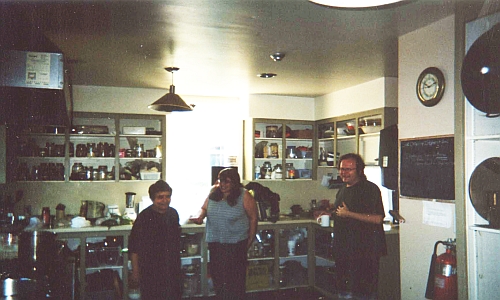
|
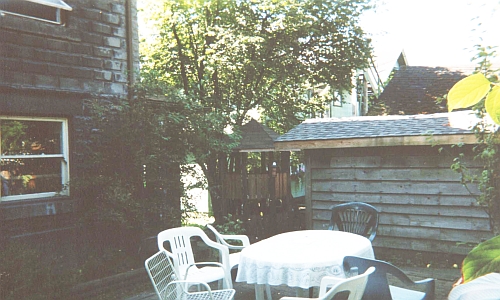
|
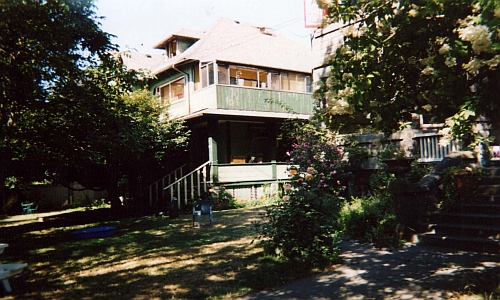
|
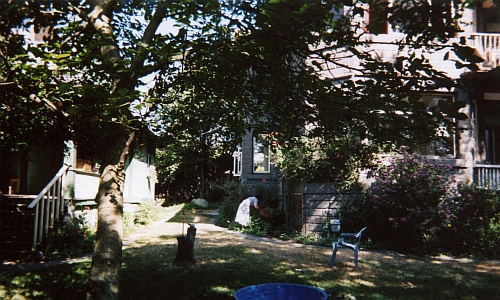
|
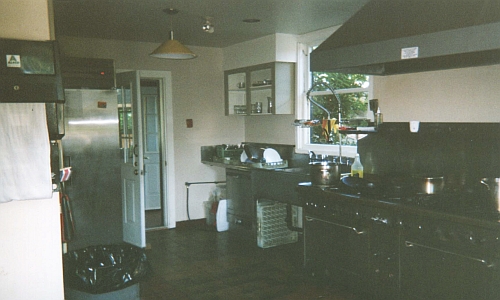
|
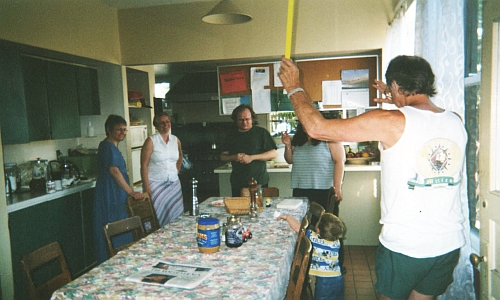
|
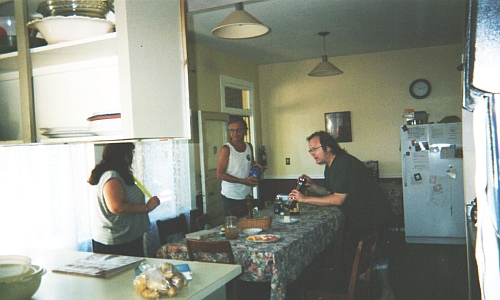
|
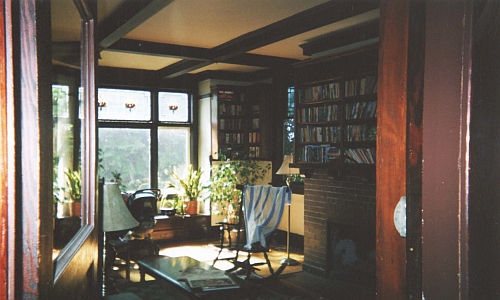
|
Early in August 2017 the New Westminster Campus Residence Co-operative Association (CRCA, "the co-op") celebrated its 50-year founding in 1967 with a reunion party. I made a big effort to attend. I found the experience rewarding, despite many frustrations, which I will not attempt to detail.
Ironically, when I walked into the kitchen in 2017 I was immediately recognized by Stephen, the fellow I had met in 2004. Like me, Stephan no longer lived at the co-op, but had come for the reunion. I did not recognize Stephen at all, so had to apologize.
One of my frustrations was that my camera battery ran-out of power early in the party, so
I had to supplement my photos with those I gleened from others at the party. These have all
been collected, along with some text, in a
Facebook album of the Co-op reunion on my Facebook page.